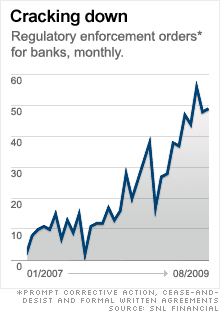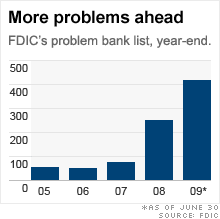Bank watchdogs crack the whip
Regulators press storm-tossed banks to shore up leaky balance sheets. But for some, it's too late for change.


NEW YORK (Fortune) -- Here's another sign of a sickly banking sector: a flurry of letters urging banks to raise money -- and fast.
Federal bank watchdogs issued 29 so-called prompt corrective action letters for the year through August. That's up from just seven over the same period a year ago, according to data tracker SNL Financial.
A prompt corrective action letter comes when regulators determine a bank has become undercapitalized, meaning it doesn't have a big enough cushion against future losses. The directives typically give banks as long as a month to bulk up, usually through issuing more shares.
In addition, officials have filed broader actions against hundreds of banks, covering issues ranging from capital and management deficiencies to risk management. All told, actions against institutions more than doubled in the first eight months of 2009, to 347, according to SNL.
Regulators have been pressing banks to straighten out their problems at a time when they are struggling under the weight of home-lending losses and bracing for a commercial real estate downturn. This year has brought 98 bank failures, with many more expected.
"There is an awful lot of softness on bank balance sheets," said Hal Reichwald, a banking lawyer at Manatt Phelps & Phillips in Los Angeles. "There's real concern about problems coming down the road and how much it will take to deal with them."
The number of banks deemed troubled by the Federal Deposit Insurance Corp. hit 416 in the quarter ended June 30, a 15-year high and nearly four times the number a year ago. The FDIC doesn't name the banks on its list or comment on open institutions, because doing so could spark damaging deposit runs.
Meanwhile, the federal deposit insurance fund has been dwindling. Member banks pay into the fund to protect account holders with balances up to $250,000. The FDIC said recently the fund has a negative balance and could run out of cash by the end of the first quarter next year. Over the past year, the deposit insurance fund balance has dropped to $10 billion from $45 billion.
The FDIC said recently that it expects expenses tied to failed banks to surge to $100 billion over five years -- up 43% from the agency's last estimate in May.
Among the institutions that has come under regulatory scrutiny is FBOP Corp., an Oak Park, Ill., holding company that owns nine banks in Illinois, California, Arizona and Texas.
Owner Michael Kelly has built the firm over nearly three decades. Starting in 1981 with one bank -- First Bank of Oak Park, from which the firm takes its name -- Kelly built the company through acquisitions into the 46th biggest bank holding company in the U.S., according to Federal Reserve data, with more than $18 billion in assets.
But FBOP was hit hard in September 2008 when Treasury took over Fannie Mae (FNM, Fortune 500) and Freddie Mac (FRE, Fortune 500), the government-sponsored mortgage investors. Treasury's decision to wipe out those firms' preferred stock left numerous banks and insurers nursing losses. FBOP has also been hurt by its longtime focus on commercial real estate. FBOP posted a loss of $708 million for 2008.
By the end of June, FBOP's resources had dwindled so low that the firm ranked below 98% of similar bank holding companies in terms of tier 1 leverage ratio, a measure of bank capital.
In August, FBOP signed a so-called written agreement with the Fed that gave it a schedule to raise capital, improve risk management and reduce its concentration of commercial real estate loans. The bank was to submit a capital plan within 30 days.
But raising capital isn't easy when banks have taken big losses and are looking at more of the same ahead, and FBOP hasn't made any announcement on the status of its planned capital raise. The company didn't return a call seeking comment.
Most banks that go on the FDIC problem list or are subject of enforcement actions survive -- though two-thirds of the banks that have received prompt corrective actions this year have already failed.
But in numerous instances over the past year, regulators -- facing deteriorating fundamentals at banks in a weak economy -- have stepped in earlier than they might have planned.
Take, for instance, Irwin Financial, a holding company that owned two banks in Ohio and Kentucky.
It agreed Sept. 11 to a so-called cease-and-desist order from the Federal Reserve, which called for it to boost its capital by the end of the month.
A week later, regulators closed Irwin's banks -- at a cost of $850 million to the deposit insurance fund. ![]()
-
 The retail giant tops the Fortune 500 for the second year in a row. Who else made the list? More
The retail giant tops the Fortune 500 for the second year in a row. Who else made the list? More -
 This group of companies is all about social networking to connect with their customers. More
This group of companies is all about social networking to connect with their customers. More -
 The fight over the cholesterol medication is keeping a generic version from hitting the market. More
The fight over the cholesterol medication is keeping a generic version from hitting the market. More -
 Bin Laden may be dead, but the terrorist group he led doesn't need his money. More
Bin Laden may be dead, but the terrorist group he led doesn't need his money. More -
 U.S. real estate might be a mess, but in other parts of the world, home prices are jumping. More
U.S. real estate might be a mess, but in other parts of the world, home prices are jumping. More -
 Libya's output is a fraction of global production, but it's crucial to the nation's economy. More
Libya's output is a fraction of global production, but it's crucial to the nation's economy. More -
 Once rates start to rise, things could get ugly fast for our neighbors to the north. More
Once rates start to rise, things could get ugly fast for our neighbors to the north. More







